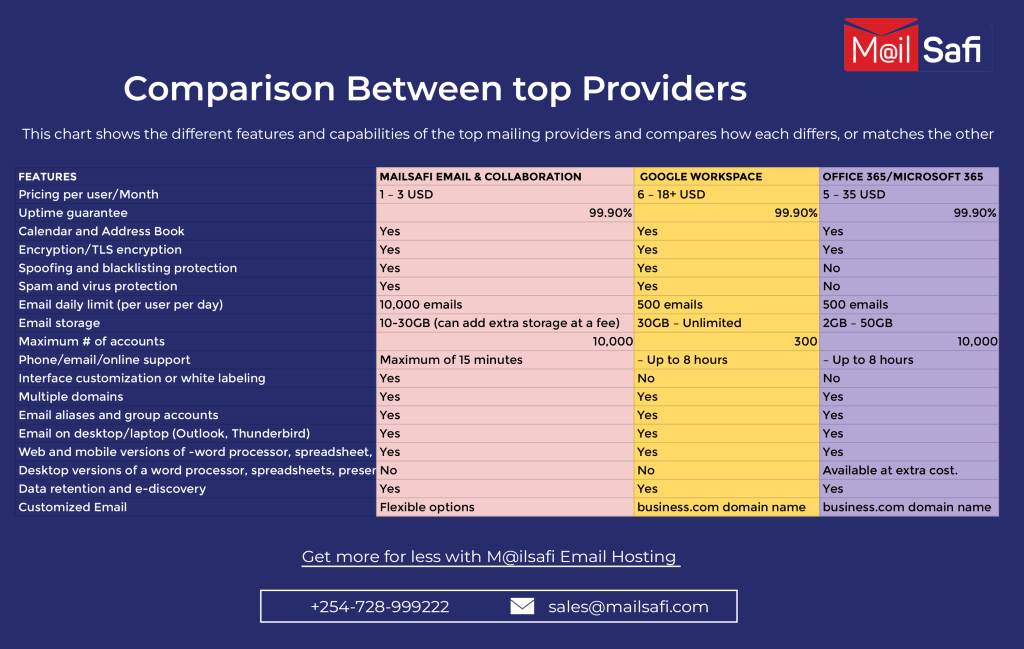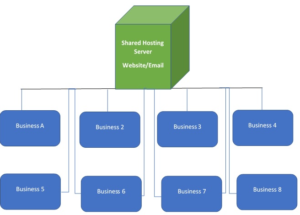Email is a critical business tool, but email hosting costs can vary wildly, leaving many companies unsure how to select the right solution while staying within their budget. Prices can range from just a few dollars per user/month up to $30+, so how do you determine what to spend?
What Impacts the Cost of Business Email Hosting?

There are several important considerations that determine the email hosting services Pricing.
Number of Email Accounts Needed
The number one factor determining the price of email hosting services is the number of mailboxes required. A solo entrepreneur can get away with low-cost shared hosting, while large enterprises with a high number of employees have exponentially higher needs and costs.
As a general rule for small businesses, email hosting plans for 1-2 email accounts per employee as a starting point and an Account for sales/support addresses, info@ company emails, and potential future growth too.
Features and Functionality
The core features provided make a big difference in email hosting service Pricing. Basic email-only plans are the cheapest while options with calendars, contacts, file sharing, security protections, archiving, advanced reporting, integrations, and more cost more due to the additional infrastructure required. Know what features matter most to your business. To avoid overpaying, know what features matter most to you before getting started.
Email Storage Space
The storage needs also impact the price. Entry-level plans may offer just up to 5GB per user, while the business-class offerings can range from 25-50GB per mailbox. Enterprise options provide virtually unlimited, terabyte-plus storage. Consider retention policies and attachment volume to determine ideal capacity.
Support and Service Reliability

Premium 24/7 customer support and rock-solid uptime guarantees come at a higher cost. Make sure support response times and service availability match your business requirements.
Security, Compliance, and Control
Advanced security tools like encryption, data loss prevention, audit logs, access controls, and integration with identity providers are central for regulated industries. These enterprise-grade capabilities mean a higher price tag.
Shared Hosting vs. Dedicated Plans vs. Enterprise Solutions
Now, let’s break down the pricing tiers for core types of email hosting plans.

Shared Hosting Plan
With shared hosting, your business utilizes the same servers and infrastructure as hundreds of other customers. This allows costs to be kept very low, under $10 per mailbox. However, resources are split between users so that performance can suffer during times of heavy traffic. Support levels are also more basic.
Ideal for solopreneurs, microbusinesses, and startups just getting started. Once you pass 10-15 employees, it’s time to consider upgrading.
Business-Class Email Hosting Plan
In the mid-range, business-focused plans offer enhanced features like spam filters, security tools, encryption, archiving, and integrations missing from basic shared plans. You also get better reliability and responsive customer support.
This plan is well-suited for small businesses with 10-100 employees looking for robust tools and top-notch deliverability. It gives you room to grow without breaking the bank, ranging from $10 or more for additional storage and premium features.
Enterprise-Level Email Solutions
Sophisticated enterprises with hundreds to thousands of employees have unique hosting needs best served by top-tier solutions. Virtually unlimited storage, personalized account management, and guaranteed SLAs ensure uninterrupted access and performance. Advanced controls and security tools are set in place to safeguard company data.
For medium to large businesses, this high degree of scale, reliability, compliance, and sophistication justifies the substantial per-user cost.
Key Email Hosting Features Beyond Monthly Pricing
The monthly per-user cost is just one facet of the value proposition. You also need to evaluate how each provider’s overall feature set meets your business requirements. Let’s explore some key capabilities beyond basic email.
1. Reliability and Uptime.
Email downtime sinks productivity and damages your reputation. Look for providers with a proven track record of 99.9% or better uptime and redundancy to keep your mail flowing 24/7/365.
2. Inbox Deliverability
Your emails must reliably reach the inbox rather than getting filtered as spam. Deliverability rates above 90% indicate quality infrastructure and IP reputation.
3. Security Protections
Today’s ever-present cyber threats make enterprise-grade security tools like spam filters, malware protection, breach detection, and encryption table stakes.
4. Data Storage and Backups
With inbox sizes ballooning, flexible storage growth options are essential. Ensure sufficient capacity for attachments and compliance archives. Robust backup facilitates rapid disaster recovery.
Final thoughts
When comparing business email hosting solutions, keep these recommendations in mind to maximize value:
- Prioritize must-have features and minimum requirements now and for future growth. Don’t overpay for unnecessary bells and whistles.
- Consider multi-year deals to secure the best long-term pricing and avoid surprises.
- Don’t get locked into rigid storage limits. Seek flexible, on-demand expansion capabilities.
- Take advantage of discounted rates for prepaid annual subscriptions when available.
- Consolidate multiple domains and accounts under one umbrella for volume savings.
The right email hosting strikes the best balance between comprehensive features tailored to your needs and budget-friendly pricing. With some savvy shopping and comparison, you can find an ideal solution to power your business growth.
![]()




